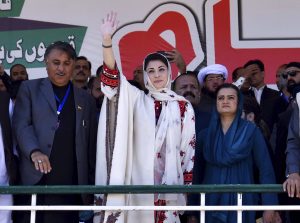Pakistan’s opposition parties rally in Quetta, the capital of restive Balochistan province, on October 25 may have pushed the country’s political situation to a point of no return. In the Quetta rally, political leaders asked questions that have always remained a “no go area” for Pakistan’s politicians.
The opposition rallies in Gujranwala and Karachi earlier in the month may have called out the country’s military leadership for their alleged interference in domestic politics, but the rally in Quetta is an altogether different ballgame.
Two weeks ago, no one in Pakistan even imagined that the country’s mainstream political parties would head to Quetta to call out the security agencies for allegedly abducting Pakistani citizens. Moreover, no one thought that Punjab’s political leadership would use Balochistan as a platform to target the military’s rank and file.
So far, the military leadership has not responded to the opposition’s attacks. There are two reasons behind the current silence from the security establishment. First, the attack from the opposition parties was so swift that the country’s national security establishment has been caught off guard. For now, they do not appear to offer an adequate response to the opposition’s onslaught. The incident of Sindh province’s Inspector General (IG) of Police being allegedly kidnapped by the intelligence agencies on October 19 – in order to force him to issue a warrant of arrest against opposition leader Safdar Awan — may have helped put the military on the back footing. It is unprecedented that the entire police force of a province went on leave to protest their IG’s mishandling by another state institution.
Furthermore, the Imran Khan-led Pakistan Tehreek-e-Insaf (PTI) government’s weak governance policies may have added fuel to the fire, making the military’s job more difficult. Sensing the mounting alienation of the public, the opposition has directly gone after the supporters of the current government. The opposition’s narrative has found a strong footing right from the get-go, and there appears to be no plan on the horizon on the part of the military as well as the Khan government to deal with the situation.
But after the Quetta rally, it is hard to imagine how the Pakistan Muslim League-Nawaz (PML-N) will ever again come to power at the provincial level in Punjab or rule the country from Islamabad. It is possible that the military’s top leadership — which the PML-N’s leadership blames for rigging the 2018 general election — is going to go for a final push to sideline the party in Punjab province. For the military, the issue is not about the PTI’s poor governance or the rigging of the last general election anymore. Instead, for the military the issue at hand is zero-sum, where the opposition’s gains would translate to its loss. The road to reconciliation between the two has closed after Quetta’s rally. The vice chairperson of the PML-N, Maryam Nawaz, has demanded that the “selectors” of the current government – a not-so-subtle reference to the country’s military establishment — should resign for their alleged interference in the last election. This is uncharted territory for everyone involved, but something that will undoubtedly not go without a response, whatever that is.
Arguably, opposition parties have ended up squarely dragging the army and the Inter-Services Intelligence (ISI) chiefs into the country’s politics. It is important to note here that the ISI chief could still become the next head of the army; perhaps that is something the opposition is also trying to avert with its naming and shaming campaign against top generals.
The opposition’s next rally is scheduled to take place in November, and a lot can happen over the next few weeks. Will there be an effort by the security establishment to reconcile with the opposition? It appears impossible after the Quetta rally. Can the situation lead to martial law in the country? It is highly unlikely at this point, given that it is not the ruling party that is challenging the military but rather the opposition. Is there a possibility of a new election? It doesn’t look like the ruling party is in a mood for a fresh election and sacrificing the government to make the opposition happy is unlikely to happen. After the Quetta rally, there is only space for more repression and control of the opposition. We may see more detentions and arrests of the opposition leaders in the coming days and weeks.
However, it is unclear if such a strategy can succeed in the current charged environment. Tough days are ahead for Pakistan.

































